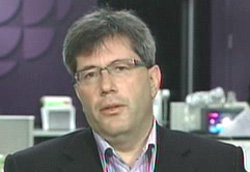 Dr. Paul Hebert, editor-in-chief of the Canadian Medical Association Journal. (CBC)
Dr. Paul Hebert, editor-in-chief of the Canadian Medical Association Journal. (CBC)Canada needs an independent czar to lead the country's response to the swine flu pandemic, according to an editorial in Monday's Canadian Medical Association Journal.
All countries need national leadership, including a "visible, independent health-care czar with executive powers across all jurisdictions and who is ultimately accountable to the highest office in the country," Dr. Paul Hébert, the journal's editor-in-chief, section editor Noni MacDonald and other members of the editorial writing team wrote.
For countries such as Canada with shared responsibilities between many levels of government, "collaboration and clear communication are essential as a first line of defence. To see that this happens, governments need to have or enact laws to provide the necessary power to ensure rapid action on complex issues."
The health czar would have more power than Canada's chief public health officer to enforce recommendations.
The editorial writers said the H1N1 pandemic virus is life-threatening for some patients and mild for most who are infected, and health-care systems should plan for increases in cases showing both ends of the spectrum in severity.
Sharing resources
If the disease continues to evolve in the northern hemisphere as it has in the southern hemisphere, especially in Chile and Australia, "we will probably experience a more severe resurgence this coming influenza season."
Unlike most seasonal flu strains, the H1N1 pandemic strain seems to invade the lower airways, resulting in more severe illness. Advanced life-support technologies for prolonged periods are often needed to save young lives, they said.
While Canada has a pandemic plan, most jurisdictions haven't yet addressed how to secure the number of experienced health-care personnel needed and how to decide where to put specialized equipment such as ventilators.
"We need leaders at all levels who will work together quickly and collaboratively to solve problems such as moving equipment and personnel from one area of a country to another as required without barriers imposed by licensing, hospital privileges and malpractice insurances concerns," the editorial said.
Vaccination logistics
Canada also needs to identify vulnerable groups and then decide how best to vaccinate them. Problems with access and delivery of a time-sensitive mass vaccination campaign need to be overcome, the writers urged.
Health Minister Leona Aglukkaq told doctors attending the Canadian Medical Association annual meeting in Saskatoon on Monday that the federal government is on track to have a pandemic vaccine ready for November, but the government is still refining its plan on who will get the vaccine first.
"What may come this fall is something that could test all of us, possibly to a limit we've never experienced," Aglukkaq said.
Judging from the questions coming from the floor and from opposition politicians, CMA members are waiting for details.
Aglukkaq's answer didn't satisfy Liberal health critic Carolyn Bennett.
"We don't hear a plan for what will happen from now until November in terms of antivirals," said Bennett, who is also a physician. "But we mainly don't hear a plan from 15.4 million doses in vials somewhere to how we're going to get those into Canadians' arms. And in what order and who's going to do it?"
Bennett said doctors are telling her they won't be able to do their regular flu shot clinics if they're looking after increasing numbers of sick people.
Aglukkaq addressed delegates but refused to answer reporters' questions about the CMAJ's call for a health czar after her speech.
The editorial also calls for a summit to link public health and other medical experts, decision-makers and the public to communicate next steps and to ensure whatever actions leaders take will actually work to save lives.
Before Dr. David Butler-Jones was appointed Canada's first chief public health officer, a CMAJ editorial also suggested the federal government enact legislation to add clear legal powers to the position during a time of crisis. The journal's editors reiterated the call after the 2008 listeriosis outbreak blamed for the deaths of 22 Canadians.
Butler-Jones lacks the power to cross a provincial power boundary to ensure guidelines are followed, which could be problematic in a pandemic, Hébert said.
"Let's say Province A, B and C don't do what they're supposed to.… who can force them to do it? Well, no one," he explained.
"What if in the middle of the epidemic it really breaks out badly and certain things need to be done and it's clear at a national level they have to be done? … We have nobody who has legislative authority to say: 'You're going to do this."'
With files from The Canadian Press